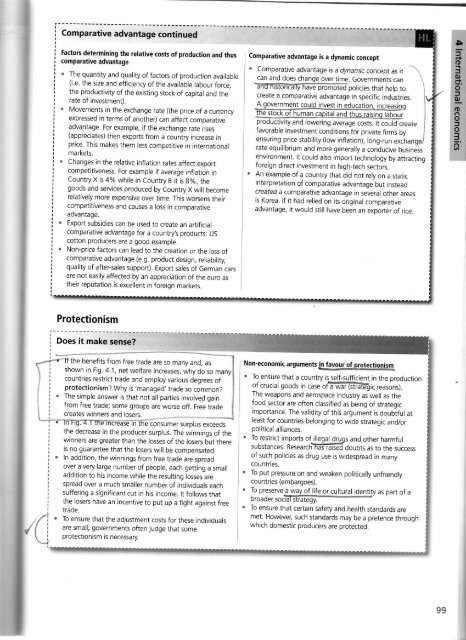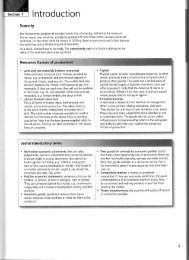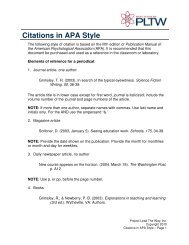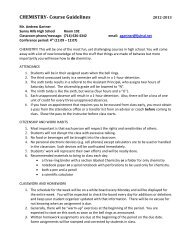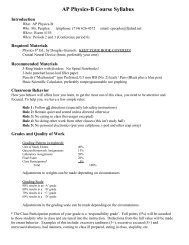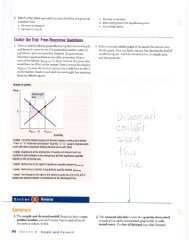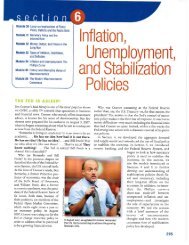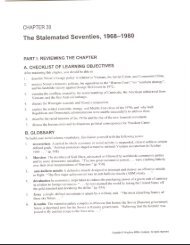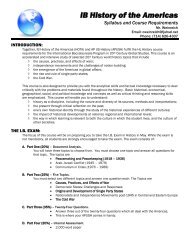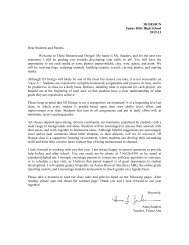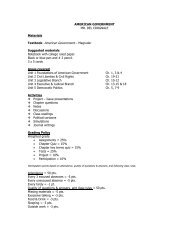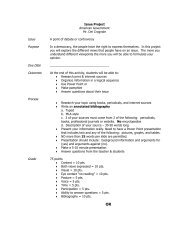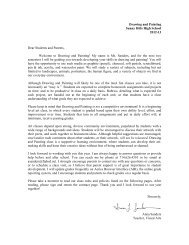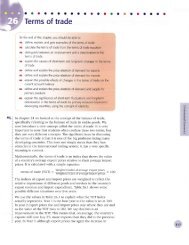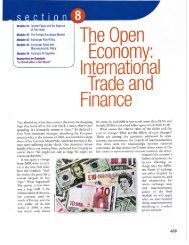IB Econ Study Guide Internationals - Sunny Hills High School
IB Econ Study Guide Internationals - Sunny Hills High School
IB Econ Study Guide Internationals - Sunny Hills High School
Create successful ePaper yourself
Turn your PDF publications into a flip-book with our unique Google optimized e-Paper software.
Comparative<br />
advantage<br />
continued<br />
Factors determining the relative costs of production and thus Comparative advantage is a dynamic<br />
comparative<br />
concept<br />
advantage<br />
. Comparative<br />
.<br />
advantage is a dnamlc<br />
The quantity<br />
concept<br />
and quality<br />
as i1<br />
of factors of production available can and does change<br />
(i.e.<br />
over time. Governments<br />
the<br />
can<br />
size and efficlency of the available labour force, d'ra ntsloflca y have promoted pol,cies<br />
the productivity<br />
tl"dt nelp to<br />
of the existing stock of capital and the create a comparative advantage in specific<br />
rate<br />
industries.<br />
of investment).<br />
A governrelt<br />
. could invest in education,<br />
Movements<br />
i.tcreasing<br />
in the exchange rate (the price of a currency Tne srocr< oi human cag!d-L4dlh"u:.&!4q.lgg9!r<br />
expressed in terms of another) can affect comDarative productivity and lowering average costs.<br />
advantage.<br />
lt could<br />
For<br />
create<br />
example, if the exchange rate rises<br />
favorable investment<br />
(appreciates)<br />
conditions for private firms by<br />
then exports from a<br />
:<br />
counTry lncrease rn ensuring price stability (low inflation),<br />
pnce.<br />
long-run<br />
This<br />
exchangeJ<br />
makes them less competitive in internationai rate equilibrium and more generally a conducive<br />
markets.<br />
business<br />
environment.<br />
.<br />
tt could also import technology<br />
Changes<br />
by<br />
in<br />
attracting<br />
the relative inflation rates affect export<br />
foreign direct investment in high-tech sectors.<br />
competltiveness. For example if average inflation in . An example of a country that did not rely on<br />
Country<br />
a static<br />
X is 4% while in Country B it is 8%, the<br />
interpretation of comparative<br />
goods<br />
advantage but instead<br />
and services produced by Country X wili become created a comparative advantage jn several<br />
relatively<br />
other areas<br />
more expensive over time. This worsens their is Korea. lf it had relied on its original comparative<br />
competlttveness and causes a loss in comparative<br />
advantage, it would stjll have been an exporter<br />
advantage.<br />
of rice.<br />
. Export subsidies can be used to create an artificial<br />
comparattve advantage for a country,s products: Us<br />
coton producers are a good example.<br />
. Non-price factors can lead to the creatjon or the loss of<br />
comparattve advantage (e.9. product design, reliability,<br />
quality of after-saies support). Export sales of German cars<br />
are not easily affected by an appreciation of the euro as<br />
their reputation is excellent in foreign markets.<br />
Protectionism<br />
;o many and, ur I<br />
:ases, why do so manyl<br />
' various degrees of I<br />
'trade so common? i<br />
rrtjes involved gajn I<br />
vorse off. Free trade<br />
I<br />
".' "..- ------"i<br />
the decrease in the producer surpius. The winnings of the<br />
winners are greater than the losses of the losers but there<br />
is no guarantee that the losers will be compensated.<br />
In addition, the winnings from free trade are spread<br />
over a very large number of people, each getting a small<br />
addition to his income while the resulting losses are<br />
spread over a much smaller number of individuals each<br />
suffering a significant cut in his income. lt follows that<br />
the losers have an incentive to put up a fight against free<br />
trade.<br />
To ensure that the adjustment costs for these individuals<br />
are small, governments often judge that some<br />
protectionism is necessary.<br />
---------.<br />
.r-... --. --,: r.';::<br />
.--a.-<br />
Non-economic arguments !!favour of proteclionism<br />
. To ensure that a country is self-sufficient in the oroduction<br />
of crucial goods in case ofir,,va-alis?hioic reasons).<br />
The weapons and aerospace inousrry<br />
aiweI as the<br />
food sector are often classified as beinq of strateoic<br />
importance. The vaIoiry of this argumenr is ooubiful at<br />
least for countries belonging to wide strategic and/or<br />
political alliances.<br />
. To restrict iTports ot illegar druqs and other har.nful<br />
subslances. Researchtlffia doubts as to the sJccess<br />
of such policies as drug use is widespread In manv<br />
countries.<br />
. To put pressure on and weaken politically unfriendly<br />
countries (embargoes).<br />
. To preserve a way of life or cultural identitv as oart of a<br />
broader socifiiratffi--<br />
. To ensure thal certain safety and health standards are<br />
met. However, such standards may be a pretence throuqh<br />
wh.ch oomestic prooucers are protected.<br />
99


